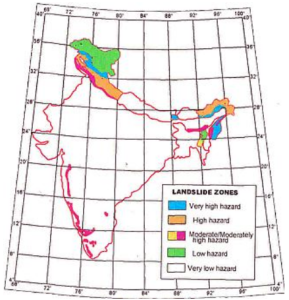Context:
A landslide in Maharashtra’s Raigad district has once again brought attention to the Dr. Madhav Gadgil report on conserving the Western Ghats.
About Gadgil Commission:
Recommendations of the Dr. Madhav Gadgil report on the Western Ghats:
News Source: The Indian Express
- In 2010, the Ministry of Environment appointed the Western Ghats Ecology Expert Panel (WGEEP), to be chaired by ecologist Dr Madhav Gadgil.
- Aim: To study the impact of population pressure, climate change and development activities on the Western Ghats.
About Western Ghats:
|
- Classification of Ecologically Sensitive Zones (ESZs): The report proposed classifying 64 percent of the Western Ghats, spread over six states, into three categories – ESZ 1, ESZ 2, and ESZ 3.
- Ecologically Sensitive Area (ESA): The entire Western Ghats region was recommended to be designated as an Ecologically Sensitive Area.
- Developmental Activities: The report called for a halt to almost all developmental activities like mining, construction of thermal power plants, and dams in ESZ 1.
- Bans and Restrictions: Genetically modified crops, plastic bags, Special Economic Zones, new hill stations, and changes in land use from farmland to non-farm land were to be prohibited.
- The diversion of rivers to protect the ecology of the region and conversion of public lands into private lands were also discouraged.
- Bottom-to-Top Governance: The report suggested a decentralized approach to governance with more power given to local authorities.
- It recommended the establishment of a Western Ghats Ecology Authority under the Environment (Protection) Act, 1986, to manage the region’s ecology and ensure sustainable development.
- Ban on Single Commercial Crops: The report called for a ban on growing single commercial crops like tea, coffee, cardamom, rubber, banana, and pineapple in the Western Ghats, as they had negative environmental impacts.
- Reduced Ecologically Sensitive Area: It has designated only 37 percent of the Western Ghats as ecologically sensitive, which was significantly lower than the 64 percent suggested by the Gadgil panel.
- Categorization of Regions: The panel split the Western Ghats into two categories – cultural regions (human settlements) and natural regions (non-human settlements).
- It proposed designating cultural lands as an Ecologically Sensitive Area (ESA).
- Categorization of Activities: The report introduced a classification of activities into three categories – red, orange, and green.
- Red Category: Activities, such as mining, stone quarrying, were recommended to be banned.
- Orange Category: Activities would be regulated and allowed with appropriate permissions.
- Green Category: All agricultural, horticultural, and certain commercial activities were allowed.
About Landslide:

|
Post Views: 177
